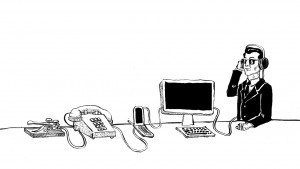Warning: Trying to access array offset on value of type bool in /home/daneciolino/public_html/lalegalethics/wp-content/plugins/footnotation/footnotation.php on line 193
 No, but it’s a question worth asking. The Professional Ethics Committee for the State Bar of Texas recently considered whether a lawyer should continue using email for client communications in the wake of recent reports of “email accounts being hacked and the NSA obtaining email communications without a search warrant.” See The Prof. Ethics Cmte. for the State Bar of Tx., Op. 648 (Apr. 2015). The committee’s1 short answer: “In general, considering the present state of technology and email usage, a lawyer may communicate confidential information by email. In some circumstances, however, a lawyer should consider whether the confidentiality of the information will be protected if communicated by email and whether it is prudent to use encrypted email or another form of communication.” Examples of such circumstances might include:
No, but it’s a question worth asking. The Professional Ethics Committee for the State Bar of Texas recently considered whether a lawyer should continue using email for client communications in the wake of recent reports of “email accounts being hacked and the NSA obtaining email communications without a search warrant.” See The Prof. Ethics Cmte. for the State Bar of Tx., Op. 648 (Apr. 2015). The committee’s1 short answer: “In general, considering the present state of technology and email usage, a lawyer may communicate confidential information by email. In some circumstances, however, a lawyer should consider whether the confidentiality of the information will be protected if communicated by email and whether it is prudent to use encrypted email or another form of communication.” Examples of such circumstances might include:
- Communicating highly sensitive information.
- Sending email to or from a shared email account.
- Sending email to a client when a third-person might access the communication.
- Sending email from or to a borrowed computer.
- Communicating by email when the NSA or a law enforcement agency may read the communication (with or without a warrant).
Under these circumstances, the committee suggests that a lawyer should obtain the client’s “informed consent” to unencrypted email communication after discussing the benefits, risks, and alternatives with the client. See id.
Under the Louisiana Rules of Professional Conduct, the standard is one of reasonableness: “A lawyer shall make reasonable efforts to prevent the inadvertent or unauthorized disclosure of, or unauthorized access to, information relating to the representation of a client.” See La. Rules of Prof’l Cond. R. 1.6(c) (2015) (emphasis added). In the vast majority of circumstances, it will be “reasonable” for a Louisiana lawyer to communicate confidential client information using unencrypted email. Only in extraordinary circumstances—such as those enumerated in the Texas advisory opinion—must a lawyer undertake extraordinary measures to safeguard a client’s information when using email.
- An Iowa ethics advisory opinion recently made similar recommendations. See Iowa Ethics Op. 15-01 (Jan. 28, 2015. ↵
